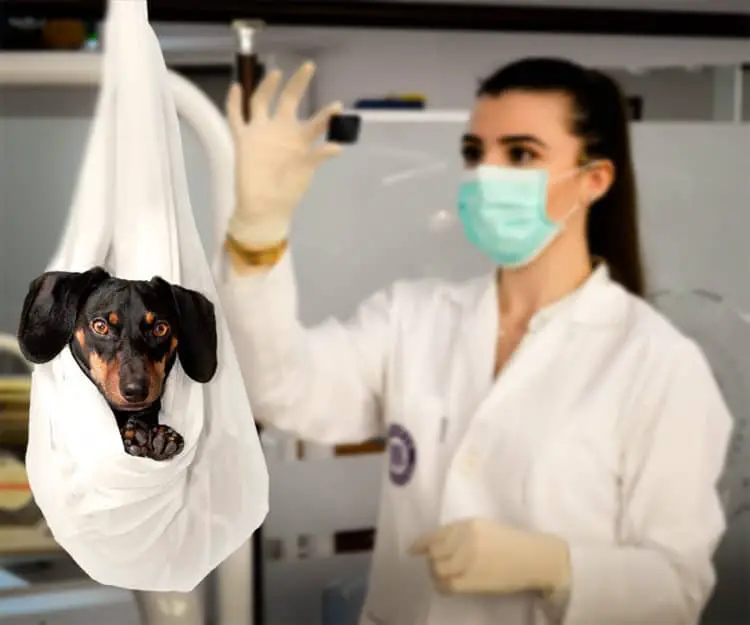Generally speaking, if you keep your dachshund fit, well exercised, and fed a healthy diet, he will live a long life. According to a Kennel Club health survey, dachshunds live 12 years and 8 months on average. Below is a list of some of the health problems that could affect your dachshund.

Back Problems
Dwarf breeds like dachshunds can suffer from a condition called Chondrodystrophy. “Chondro” means “cartilage” and “dystrophy” means “disorder.” It refers to the abnormal development of bone and cartilage that can occur as a puppy grows into an adult dog. The longer bones in a dachshund’s body are particularly affected, and the condition can result in a shortening of the limbs. In dwarf breeds, this condition is genetic.
When any animal ages, it suffers from disc degeneration. This happens when a disc loses water, becomes more fibrous, or calcifies. Sometimes, a disc can even rupture. Disc disease, also known as Intervertebral Disc Disease (IVDD), can happen at any age, but usually occurs with advanced age. Here are some signs that your dachshund may be suffering from a back problem, such as Chondrodystrophy or IVDD:
- Reluctance to jump or move
- Loss of bladder and bowel control
- Crying and/or shaking
- Poor appetite on account of pain
- Paralysis to rear legs
- Hunched appearance
If you see any of the signs mentioned above, you should immediately take your dog to a vet.
Although there is not much that can be done to prevent disc disease, you can try to reduce the risk of injury by following these steps:
- Provide regular exercise.
- Don’t allow your dog to become obese.
- Lift your dog with both hands; one hand should support his chest, and the other should support his back end.
- Avoid stairs and do not allow your dog to jump on or off the furniture.
Cancer And Tumors
A tumor is a swelling or lesion that has formed as a result of abnormal cell growth. Tumors are not synonymous with cancer. They can be benign, pre-malignant, or malignant. Cancer, on the other hand, is malignant. With cancer, the age of onset, the type, and the location all vary. Cancer rates do increase with age. Make sure to check your dog for any unusual lumps when you handle, groom, or pet him. A lump can be harmless, and the result of bruising, infection, or abscess. If something worries you, be sure to consult the vet immediately, especially if a lump is quickly increasing in size or if several lumps start developing.
More recently, responsible dog breeders have become more in demand, and it is possible to breed puppies with the best chance of living long, healthy lives, thanks to DNA screening. A responsible dog breeder should conduct a DNA test of all breeding stock before encouraging them to produce litters. This type of testing can reveal:
- A “Clear” (two copies of the normal gene)
- A “Carrier” (one copy of the normal gene and the other copy of the mutant gene)
- An “Affected” (two copies of the mutation)
This information can be used by breeders when they are selecting a genetically compatible mate. Similarly, it will also help breeders avoid mating two animals that are likely to result in the production of “Affected” puppies.
Experts recommend that all three miniature dachshund types be tested for cord1 Retinal Degeneration (PRA) and for Lafora disease.
Eye Disease
Several inherited eye problems can affect your dog. Fortunately, there are DNA tests for two of these problems. These are cord1 PRA and NPHP4 Day Blindness. It is important to take your dachshund for clinical eye exams to be conducted by a qualified vet. Responsible breeders should provide a certificate displaying the status of a puppy’s eye health, as well as results from any relevant DNA tests.
Cataract
Cataracts cloud the eye, making a dog’s vision opaque. They are hereditary in dogs, and may appear at any age. Cataracts are commonly found in dachshunds, and they can result in impaired vision or even blindness. At present, there is no known cure for cataracts. However, you can encourage your dog’s eye health and strengthen the lenses of his eyes by providing nutritional supplements.
Glaucoma
Canine Glaucoma is a condition commonly found in a large number of dogs, and it is a major cause of blindness. This problem is caused by excess fluid in the eye. It is a hereditary condition. Before breeding, all dogs should be tested for it.
Progressive Retinal Atrophy (PRA)
This is a common eye condition found in dachshunds, caused by an inherited disorder that affects the retina. PRA can cause visual impairment, which slowly gets worse with the passage of time. Common symptoms include dilated pupils and night blindness. There is currently no known cure for PRA.
Some other eye conditions that affect dachshunds include: congenital night blindness, tear duct anomalies, ectasia syndrome, and microphthalmia.
Fits (Epilepsy)
Epilepsy is a common and chronic neurological disorder. This disease is characterized by recurrent and unprovoked seizures. It is important to note that seizures are a clinical sign and not the disease itself. A seizure may take place as an isolated event or it may take place in clusters. Status epilepticus and cluster seizures need to be treated as a medical emergency. A particular type of epilepsy known as Lafora disease may be present in the case of the mini wire-haired dachshund. Thankfully, there is a DNA screening test available to determine the presence of this disease. In general, nearly 4% of dogs suffer from epilepsy. However, there is no scientific evidence that reveals what percentage of dachshunds suffer epileptic seizures. Currently, there are no screening tests available for primary (idiopathic) epilepsy. Dogs that are clinically diagnosed with epilepsy shouldn’t be used for breeding. If you’re thinking of purchasing a puppy, you should ask the breeder if the dog has a history of epilepsy in its pedigree.

Genetics
Genetics can be described as the study of genes, inheritance and the variation that may be present in the case of living things. It is particularly significant for dog breeders because a little understanding regarding genetics can help breeders avoid inherited conditions, and it also allows them to plan for desirable traits in the litter and to preserve the genetic diversity of the breed in the future. It is always possible for a genetic mutation to be passed on to the next generation.
The more genetically diverse a dog is, meaning the dog is not “inbred,” the less likely he will carry bad genetic mutations.
Heart Diseases
Heart Murmurs
Heart murmurs can be present in normal, disease-free hearts and they often do not result in any trouble for the dog. Murmurs can be detected in some dachshund puppies (less than eight weeks old), but very soon are resolved when the dog grows up. Heart murmurs are more commonly seen in elderly dogs.
On the other hand, heart murmurs can also be caused by different problems like the narrowing or the leaking of valves or the presence of abnormal blood-flow passages. These types of murmurs are called pathologic murmurs and they need to be evaluated by a medical expert.
Mitral valve disease
Mitral valve disease is a cardiac disease that is most commonly found in dogs more than 10 years of age. Generally, this disease affects nearly one-third of all dogs. Most often, small breeds are affected by it, and the disease is more prevalent in male dogs than in female dogs. Mitral valve disease can be described as the abnormal leaking of blood through the mitral valve. It is thought that mitral valve disease has a genetic basis.
Early signs of this disease include a reduced tolerance for exercise, problems breeding, and coughing at night. Likewise, signs that indicate a failing heart include weakness, fainting, or collapse.
Inherited Disorders
As is the case with humans, a dog may also have an inherited disorder, on account of the genes that were passed down from his parents. There is a long list of inherited diseases that can affect dachshunds, but this does not mean that such inherited disorders are necessarily widespread or commonly found in the breed.
Some of examples of inherited conditions that are commonly found in dachshunds can be reviewed on the health website of the Breed Council or Breed Club, which provides the most up-to-date information related to inherited diseases and how they can affect your dachshund.
Kennel Cough
Kennel cough is the result of a bacterium and as such, it is possible to treat this problem with antibiotics. It is also possible to vaccinate me against kennel cough. Generally, I will need this vaccination if I am to stay in commercial kennels for any length of time. The effectiveness of the vaccination lasts for 6 to 12 months. However, unfortunately, kennel cough is a common name for all infectious coughing conditions, so the vaccine may not prove to be effective in preventing me from picking up this disease.
Symptoms of kennel cough include sneezing, coughing, runny nose, and runny eyes. All these problems may last for several weeks. This is the period when I am highly infectious. During this time, I should not be allowed to socialize with other dogs. If you have several other dogs, it is almost certain that they will contract the disease, to some extent, depending on their level of immunity. Kennel cough may prove to be particularly serious for young puppies and also for elderly dogs. However, for most of dogs, this condition does not have any adverse, long-lasting effects.
Lafora Disease
Lafora disease is an inherited form of epilepsy and it affects miniature, wire-haired dachshunds. Typically, this condition becomes apparent from the age of 5 onward. Signs present in the form of major fits, jerking of the head, dementia, apparent blindness, and unsteady feet. Myoclonus (jerking) is a significant feature of this disease. Jerking can be induced by sudden sound or movement or flashing lights, particularly if the action is close to a dog’s head. The progress of the disease is slow and it takes several years to develop. Gradually, other neurological symptoms will emerge, like blindness, ataxia, and dementia.
Dogs affected by Lafora disease face the risk of producing more affected puppies if they are bred. A screening program of wire-haired dachshunds identified nearly 10% affected miniature wire-haired dachshunds in their sample. This means that nearly half the miniature wire-haired dachshund population may be carrying the Lafora mutation. Since this disease has a late-onset, most dogs that are bred will have been bred before they show any signs of this disease. The only way in which we can avoid this is to use a DNA test for screening all breeding stock before mating.
Obesity
In order to keep me happy and healthy, you should keep my weight at the right level throughout my life. If I am overweight or underweight, it can result in serious health problems. It is a good idea to make it a habit to check my weight regularly. The risk of obesity in a dachshund increases with age. Obesity is also generally found more in neutered dogs. There are other risks associated with obesity, like diabetes and osteoarthritis. The most common solution to deal with this problem is to reduce the quantity of food that I eat or to move to a lower calorie food. Calorie intake also includes any treats given to me.

Quick Weekly Checks
Once a week, my owner should check to see if my eyes are clear and my ears are clean, also if my nails need cutting. Walking on a hard surface or concrete will help wear my nails down, but they might occasionally need to be cut as well. You should get the vet’s advice on how to cut my nails at home. Another important thing is to brush my teeth with a very soft toothbrush. This should be done at least once a week. For this purpose, you can use dog toothpaste. You should also make sure that my coat is tangle free. Finally, you should feel for any bumps, lumps or cuts on my body.
I am famous for eating anything and everything. Therefore, be ready for occasional upset stomach incidents. And if I’m taken out on walks in the countryside, I can easily scavenge all types of dead or disgusting objects. While some of these objects can be harmless, others can have a more dramatic effect or in some cases, may turn out to be poisonous. In general, I am capable of going without food for 24 hours. Then I should be fed with a bland diet like cooked chicken for some days until my normal health is restored. My owner should always make sure that I have access to plenty of drinking water at all times so that I do not become dehydrated. If I am passing blood or vomiting frequently in a period of 24 hours, my owner should immediately seek the vet’s advice. The reason is that I may have been poisoned or swallowed something that has resulted in a blockage; or I may need treatment for an infection, or may be suffering from some other serious disease.
Teeth
I have strong teeth and my powerful canine teeth fit closely. Similarly, my jaw should be strong and I have a regular, perfect and complete scissor bite. This means that my upper teeth should close the overlap with my lower teeth and they should set squarely to my jaw. When I have all my adult teeth (this takes nearly 6 months), my owner should start brushing my teeth once a week. For this purpose, a soft toothbrush should be used, as well as doggie toothpaste and not toothpaste made for humans.
If my teeth smell bad, it may be a sign of a dental problem or a gum disease. You should immediately ask the vet for advice regarding this issue. Sometimes, by introducing a change in diet, this issue can be resolved. Several food additives can reduce plaque and improve freshness of breath. However, even after regularly brushing my teeth, you may simply have to learn to live with my “foul breath.”
Worming
The two major types of worms of which my owner should be aware are tapeworms and roundworms. In most young dachshund puppies, there is some level of roundworm infestation that has been passed on to them by their mothers while they were still in the womb. When the new puppy is brought home, it needs to be dewormed many times and a record needs to be maintained of the times when deworming has been done. On the other hand, tapeworms are generally acquired from fleas as they carry the eggs of the worm.
Conclusion
Even if a particular issue has been described here, it does not mean that the problem is found in or commonly affects dachshunds.
See Also My Other Related Posts:
Don't Forget To Make Your Dachshund Happy And Check Out Dachshund Favorite Products!
In my article, I reveal all the information about Dachshund’s Favorite Food. The best dachshund food available on the market: Most Nutritious And Delicious Dachshund Food Products Available On The Market
If you want to learn what are the latest trends in Dachshund fashion check my article: Dachshund’s Fashion. How to choose the dachshund clothes that just simply fit: Finding the Right Clothes for Your Dachshund
If you want to prepare your beloved Dachshund for cold weather check out my article: Jackets And Outdoor Gears For Dachshund.
To go out with your dachshund, but not choke him to death check out my article about harnesses: Finding The Best Harness for Dachshund When you are ready to get one check the options available on the market Choosing The Right Harness For Your Dachshund

